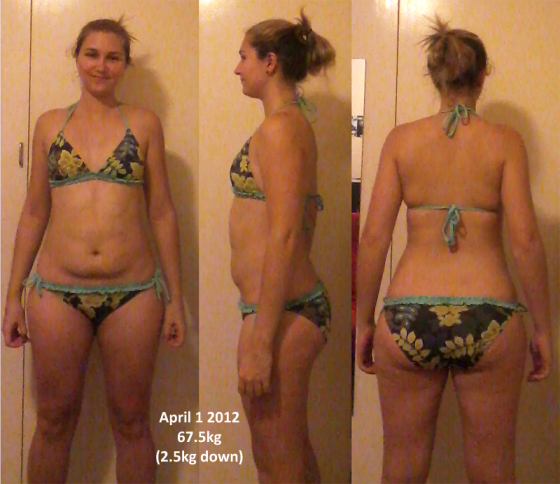BMI called into question again - potential revamp?

vidoardes
Posts: 70 Member
Interesting article from the BBC today (I am not sure if this is accessible outside the UK so I will paste the text below):
http://www.bbc.co.uk/news/health-17585734
The obesity problem in the US may be much worse than previously thought, according to researchers.
They said using the Body Mass Index or BMI to determine obesity was underestimating the issue.
Their study, published in the journal PLoS One, said up to 39% of people who were not currently classified as obese actually were.
The authors said "we may be much further behind than we thought" in tackling obesity.
BMI is a simple calculation which combines a person's height and weight to give a score which can be used to diagnose obesity. Somebody with a BMI of 30 or more is classed as obese.
The US Centers for Disease Control says at least one in three Americans are obese.
Many more?
Other ways of diagnosing obesity include looking at how much of the body is made up of fat. A fat percentage of 25% or more for men or 30% or more for women is the threshold for obesity.
One of the researchers Dr Eric Braverman said: "The Body Mass Index is an insensitive measure of obesity, prone to under-diagnosis, while direct fat measurements are superior because they show distribution of body fat."
The team at the New York University School of Medicine and the Weill Cornell Medical College, New York, looked at records from 1,393 people who had both their BMI and body fat scores measured.
Their data showed that most of the time the two measures came to the same conclusion. However, they said 539 people in the study - or 39% - were not labelled obese according to BMI, but their fat percentage suggested they were.
They said the disparity was greatest in women and became worse when looking at older groups of women.
"Greater loss of muscle mass in women with age exacerbates the misclassification of BMI," they said.
They propose changing the thresholds for obesity: "A more appropriate cut-point for obesity with BMI is 24 for females and 28 for males."
A BMI of 24 is currently classed as a "normal" weight.
"By our cut-offs, 64.1% or about 99.8 million American women are obese," they said.
It is not the first time BMI has been questioned. A study by the University of Leicester said BMIs needed to be adjusted according to ethnicity.
Last year in the BBC's Scrubbing Up column, nutrition expert Dr Margaret Ashwell advocated using waist-to-height ratio to determine obesity.
She said: "It is a real worry that using BMI alone for screening could miss people who are at risk from central obesity and might also be alarming those whose risk is not as great as it appears from their BMI."
http://www.bbc.co.uk/news/health-17585734
The obesity problem in the US may be much worse than previously thought, according to researchers.
They said using the Body Mass Index or BMI to determine obesity was underestimating the issue.
Their study, published in the journal PLoS One, said up to 39% of people who were not currently classified as obese actually were.
The authors said "we may be much further behind than we thought" in tackling obesity.
BMI is a simple calculation which combines a person's height and weight to give a score which can be used to diagnose obesity. Somebody with a BMI of 30 or more is classed as obese.
The US Centers for Disease Control says at least one in three Americans are obese.
Many more?
Other ways of diagnosing obesity include looking at how much of the body is made up of fat. A fat percentage of 25% or more for men or 30% or more for women is the threshold for obesity.
One of the researchers Dr Eric Braverman said: "The Body Mass Index is an insensitive measure of obesity, prone to under-diagnosis, while direct fat measurements are superior because they show distribution of body fat."
The team at the New York University School of Medicine and the Weill Cornell Medical College, New York, looked at records from 1,393 people who had both their BMI and body fat scores measured.
Their data showed that most of the time the two measures came to the same conclusion. However, they said 539 people in the study - or 39% - were not labelled obese according to BMI, but their fat percentage suggested they were.
They said the disparity was greatest in women and became worse when looking at older groups of women.
"Greater loss of muscle mass in women with age exacerbates the misclassification of BMI," they said.
They propose changing the thresholds for obesity: "A more appropriate cut-point for obesity with BMI is 24 for females and 28 for males."
A BMI of 24 is currently classed as a "normal" weight.
"By our cut-offs, 64.1% or about 99.8 million American women are obese," they said.
It is not the first time BMI has been questioned. A study by the University of Leicester said BMIs needed to be adjusted according to ethnicity.
Last year in the BBC's Scrubbing Up column, nutrition expert Dr Margaret Ashwell advocated using waist-to-height ratio to determine obesity.
She said: "It is a real worry that using BMI alone for screening could miss people who are at risk from central obesity and might also be alarming those whose risk is not as great as it appears from their BMI."
0
Replies
-
That seems legit... :sad:0
-
Hmm...5'7", 37yrs old...
The old method has me borderline obese...the newly proposed method would land me smack in the middle of the obese category.
Uhh...yeah, right.0 -
*roll* ... sure, so it's a crappy method, so let's LOWER the threshold ...0
-
BMI is a pile of Cr*p! Using that alone as a means of classifying people would result in top-class rugby players being classified as obese! It should be scrapped as a measure as it is innacurate.0
-
BMI is a pile of Cr*p! Using that alone as a means of classifying people would result in top-class rugby players being classified as obese! It should be scrapped as a measure as it is innacurate.
Totally agree with this!!! My personal trainers say it should be ignored and it is % body fat which you should be worrying about instead.0 -
BMI tells me I'm obese :laugh:0
-
BMI is an appallingly misused measurement. However, lowering the cutoff point for 'healthy' will not change anything except the number of people classed as 'obese' - btw, where's 'overweight' gone? - and won't catch the people whose body fat percentage is high, but weight is low, whilst mistakenly classing many whose physique is muscular, body fat percentage is low, and/or frame is large as 'at risk'. Instead of this pointless knee-jerk reaction, how about changing the predominant measurement, and take body fat measurements as an indicator of risk rather than misapplying a tool meant for populations to individuals?0
-
Maaan I was pleased about getting out of the obese category and now they want to shove me right back in it again

Seriously though, I would have thought they'd it up if anything? Even when I was classed 'obese' - I know I was big and not healthy and maybe seeing myself through rose-tinted glasses but I would never have thought myself 'obese'.0 -
If you are interested in the original article, you can find it here: http://www.plosone.org/article/info:doi/10.1371/journal.pone.0033308#s4
The points are interesting, but the study has issues in that it's cross sectional and uses a convenience sample. Basically, they used medical charts of people whose height and weight they had and who got DXA scans withing a certain time of getting height and weight measured. These were people getting bone density scans for other reasons. The sans weren't given to a normal, healthy population as part of the study. This in an of itself could skew the data.
The sample was not racially or ethnically diverse, and they could not consider hip weight ratio in addition to BMI. The average age of subjects was 51, and the subjects were more than 60% women. 75% of subjects were white.
Also, because they didn't follow subjects, they can't say their new "obese" category has the same risks as the current "obese" category.
I think that BMI is wildly inaccurate both ways, but this doesn't fix it IMO.0 -
So this makes it so that those with muscle look even more obese by their BMI? WTF sense does that make?0
-
I don't pay attention to BMI. I pay attention to body fat %. BMI has so many flaws as to make it worthless in my opinion.0
-
i think body fat percentage is the best way to evaluate whether a person is healthy or not - weight is not directly correlated with health (ask any athlete or bodybuilder).0
-
BMI is useless. Basically, my BMI is nearly unchanged because I've lost only 8 pounds this year, even though I've lost 12 1/2 inches and so much fat it isn't funny? Clearly, my BMI is NOT the same, although a pure age/height/weight analysis would say it is.0
-
Hmm...5'7", 37yrs old...
The old method has me borderline obese...the newly proposed method would land me smack in the middle of the obese category.
Uhh...yeah, right.
For men the obese category will increase to 28, so you will be further under the new one, vs. the old.0 -
But the study said that BF% would be taken into account when measuring BMI, correct? So people with low BF% and high muscle mass, eg. rugby players, surely would be exempt? I personally am all for BF% because, unlike BMI, there's a concrete "healthy" range. Some women look okay at BMI 25, some at 20, some below 20, but all women would be damaging their health at BF% 25+ correct?0
-
BMI needs to just stop being used. They already lowered BMI once, from 28(ish) to 25. Lowering it again won't change anything, as it still has absolutely no correlation with body fat.0
-
But the study said that BF% would be taken into account when measuring BMI, correct? So people with low BF% and high muscle mass, eg. rugby players, surely would be exempt? I personally am all for BF% because, unlike BMI, there's a concrete "healthy" range. Some women look okay at BMI 25, some at 20, some below 20, but all women would be damaging their health at BF% 25+ correct?
No, it is adjusting the numbers in BMI to more closely reflect BF% that they found in the study. BF% will still be a separate measure from BF%.0 -
So why not make the measure use both?!...The team at the New York University School of Medicine and the Weill Cornell Medical College, New York, looked at records from 1,393 people who had both their BMI and body fat scores measured.
Their data showed that most of the time the two measures came to the same conclusion. However, they said 539 people in the study - or 39% - were not labelled obese according to BMI, but their fat percentage suggested they were...0 -
So this makes it so that those with muscle look even more obese by their BMI? WTF sense does that make?
Only for women, they are increasing the scale for men, as men naturally carry more lean muscle then women.0 -
So why not make the measure use both?!...The team at the New York University School of Medicine and the Weill Cornell Medical College, New York, looked at records from 1,393 people who had both their BMI and body fat scores measured.
Their data showed that most of the time the two measures came to the same conclusion. However, they said 539 people in the study - or 39% - were not labelled obese according to BMI, but their fat percentage suggested they were...
BF% is not as easy to measure and most devices used are very inaccurate, so to get a real reading would be expensive.0 -
I don't pay attention to BMI. I pay attention to body fat %. BMI has so many flaws as to make it worthless in my opinion.
Body Fat is apparently very hard to measure. I range from 9.5-14 using 3 different methods. DXA algorithm 1: 9.5, DXA algorithm 2: 14, BodPod: 12.50 -
I think the whole BMI thing is crap. I've only lost a few pounds but I've lost well over 30 inches, and my LBM has increased yet my BMI is unchanged. If you look at my before and now pictures you can see a world of difference.0
-
I hate BMI! Although mine is what they call "normal" my little sisters ( ages 17 and 15) and little brother (age 14) were all told they are obese! Now, I'm not saying any of them are in great physical shape, but they live on a large farm and are constantly on the run and lifting heavy things every single day! Both my sisters are a size 8 for petes sake! Try convincing a bunch of teens the the Internet is wrong......ugh.....thanks for the help BMI! Way to slash into kids self esteem! Grrrrr!0
-
So this makes it so that those with muscle look even more obese by their BMI? WTF sense does that make?
Only for women, they are increasing the scale for men, as men naturally carry more lean muscle then women.
They suggested lowering Obese from 30 to 28 for men and from 30 to 24 for women.0 -
Glad I saw this. I was checking my BMI for shoots in giggles and was thinking the weight they say I should be to be healthy to me would be way to skinny. Glad to see i'm not the only one who feels this way.0
-
BMI is an appallingly misused measurement. However, lowering the cutoff point for 'healthy' will not change anything except the number of people classed as 'obese' - btw, where's 'overweight' gone? - and won't catch the people whose body fat percentage is high, but weight is low, whilst mistakenly classing many whose physique is muscular, body fat percentage is low, and/or frame is large as 'at risk'. Instead of this pointless knee-jerk reaction, how about changing the predominant measurement, and take body fat measurements as an indicator of risk rather than misapplying a tool meant for populations to individuals?
I was going to type something- but why when this ^^ is much more eloquent than what I would have said. A lot less cursing too.0 -
So this makes it so that those with muscle look even more obese by their BMI? WTF sense does that make?
Only for women, they are increasing the scale for men, as men naturally carry more lean muscle then women.
They suggested lowering Obese from 30 to 28 for men and from 30 to 24 for women.
Sorry my bad I thought the were changing women from 25 to 24 and men from 25 to 28. I must have missed that part, I was thinking overweight at 25, not obese. Thanks.0 -
"A fat percentage of 25% or more for men or 30% or more for women is the threshold for obesity."

This is supposedly 30% body fat.
Don't know where this news article got 30% = obese. Last I checked 35% = overweight.0 -
"A fat percentage of 25% or more for men or 30% or more for women is the threshold for obesity."

This is supposedly 30% body fat.
Don't know where this news article got 30% = obese. Last I checked 35% = overweight.
http://www.bmi-calculator.net/body-fat-calculator/body-fat-chart.php
according to this chart obese stats at 32%0 -
I agree. Body fat % is a much more reliable way to determine if an individual is overweight or obese. BMI is a calculation and leaves much room for error (clearly).0
This discussion has been closed.
Categories
- All Categories
- 1.4M Health, Wellness and Goals
- 398.1K Introduce Yourself
- 44.7K Getting Started
- 261K Health and Weight Loss
- 176.4K Food and Nutrition
- 47.7K Recipes
- 233K Fitness and Exercise
- 462 Sleep, Mindfulness and Overall Wellness
- 6.5K Goal: Maintaining Weight
- 8.7K Goal: Gaining Weight and Body Building
- 153.5K Motivation and Support
- 8.4K Challenges
- 1.4K Debate Club
- 96.5K Chit-Chat
- 2.6K Fun and Games
- 4.8K MyFitnessPal Information
- 12 News and Announcements
- 21 MyFitnessPal Academy
- 1.5K Feature Suggestions and Ideas
- 3.2K MyFitnessPal Tech Support Questions




















